Tourism Planning and Organisation
VerifiedAdded on 2020/07/22
|13
|3581
|39
AI Summary
This document presents a collection of research papers and studies related to tourism planning and organisation. The papers cover various topics such as sustainable tourism, destination governance, wine tourism development in South Africa, factor analysis in tourism, public administration and tourism, medical tourism ethics regulation and marketing, spatial patterns of robbery at tourism sites, and environmental concerns. Each paper provides an in-depth examination of the subject matter, offering valuable insights for researchers, policymakers, and industry professionals.
Contribute Materials
Your contribution can guide someone’s learning journey. Share your
documents today.
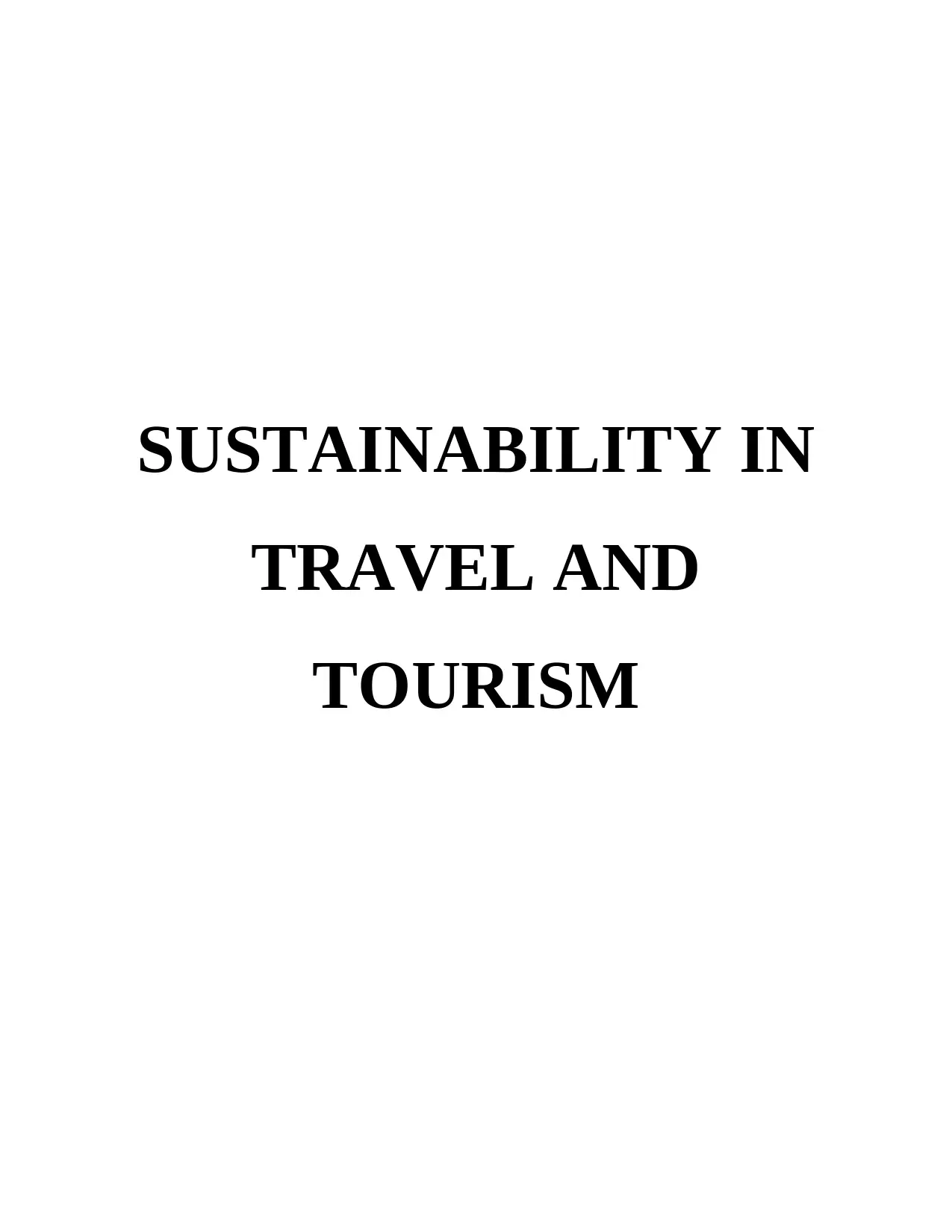
SUSTAINABILITY IN
TRAVEL AND
TOURISM
TRAVEL AND
TOURISM
Secure Best Marks with AI Grader
Need help grading? Try our AI Grader for instant feedback on your assignments.
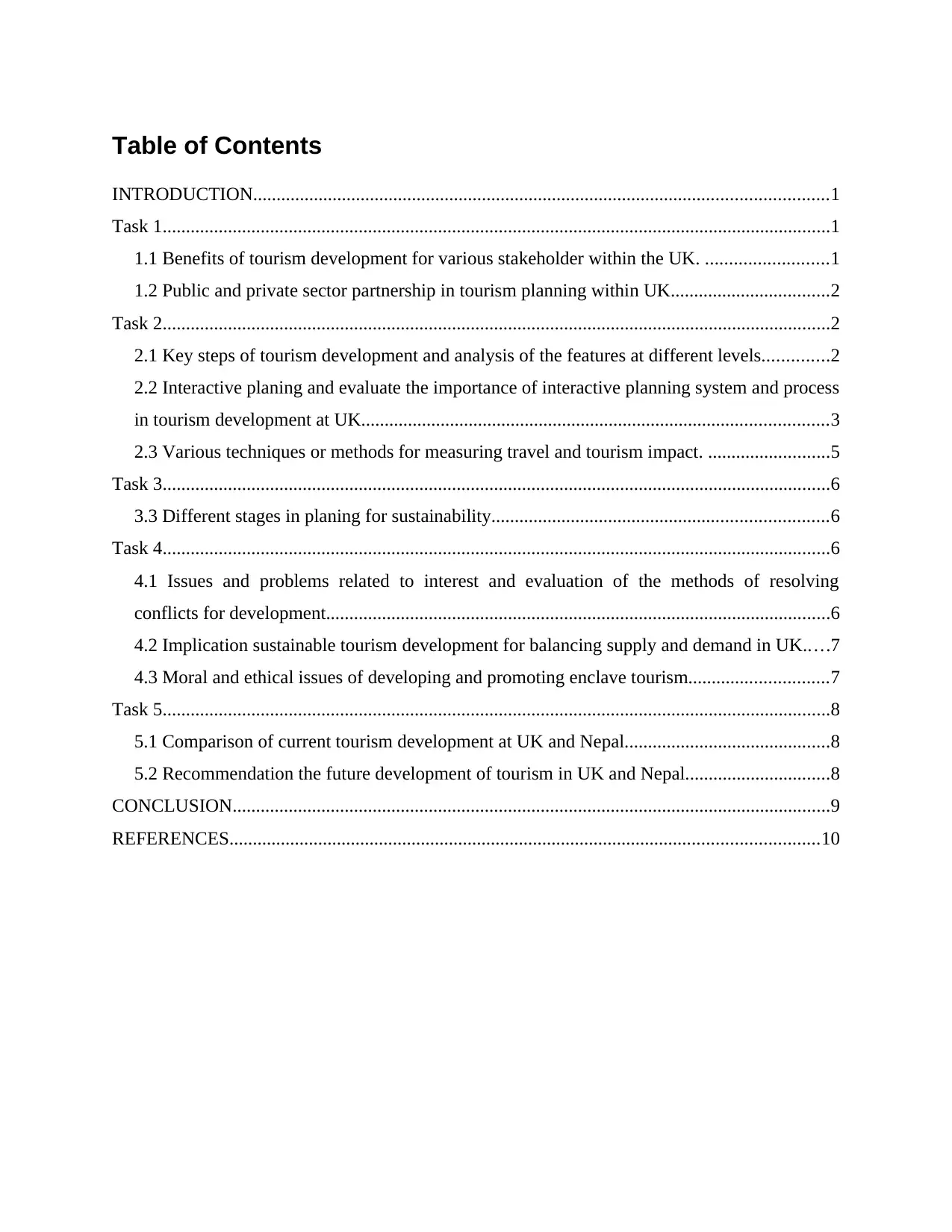
Table of Contents
INTRODUCTION...........................................................................................................................1
Task 1...............................................................................................................................................1
1.1 Benefits of tourism development for various stakeholder within the UK. ..........................1
1.2 Public and private sector partnership in tourism planning within UK..................................2
Task 2...............................................................................................................................................2
2.1 Key steps of tourism development and analysis of the features at different levels..............2
2.2 Interactive planing and evaluate the importance of interactive planning system and process
in tourism development at UK....................................................................................................3
2.3 Various techniques or methods for measuring travel and tourism impact. ..........................5
Task 3...............................................................................................................................................6
3.3 Different stages in planing for sustainability........................................................................6
Task 4...............................................................................................................................................6
4.1 Issues and problems related to interest and evaluation of the methods of resolving
conflicts for development............................................................................................................6
4.2 Implication sustainable tourism development for balancing supply and demand in UK.....7
4.3 Moral and ethical issues of developing and promoting enclave tourism..............................7
Task 5...............................................................................................................................................8
5.1 Comparison of current tourism development at UK and Nepal............................................8
5.2 Recommendation the future development of tourism in UK and Nepal...............................8
CONCLUSION................................................................................................................................9
REFERENCES..............................................................................................................................10
INTRODUCTION...........................................................................................................................1
Task 1...............................................................................................................................................1
1.1 Benefits of tourism development for various stakeholder within the UK. ..........................1
1.2 Public and private sector partnership in tourism planning within UK..................................2
Task 2...............................................................................................................................................2
2.1 Key steps of tourism development and analysis of the features at different levels..............2
2.2 Interactive planing and evaluate the importance of interactive planning system and process
in tourism development at UK....................................................................................................3
2.3 Various techniques or methods for measuring travel and tourism impact. ..........................5
Task 3...............................................................................................................................................6
3.3 Different stages in planing for sustainability........................................................................6
Task 4...............................................................................................................................................6
4.1 Issues and problems related to interest and evaluation of the methods of resolving
conflicts for development............................................................................................................6
4.2 Implication sustainable tourism development for balancing supply and demand in UK.....7
4.3 Moral and ethical issues of developing and promoting enclave tourism..............................7
Task 5...............................................................................................................................................8
5.1 Comparison of current tourism development at UK and Nepal............................................8
5.2 Recommendation the future development of tourism in UK and Nepal...............................8
CONCLUSION................................................................................................................................9
REFERENCES..............................................................................................................................10
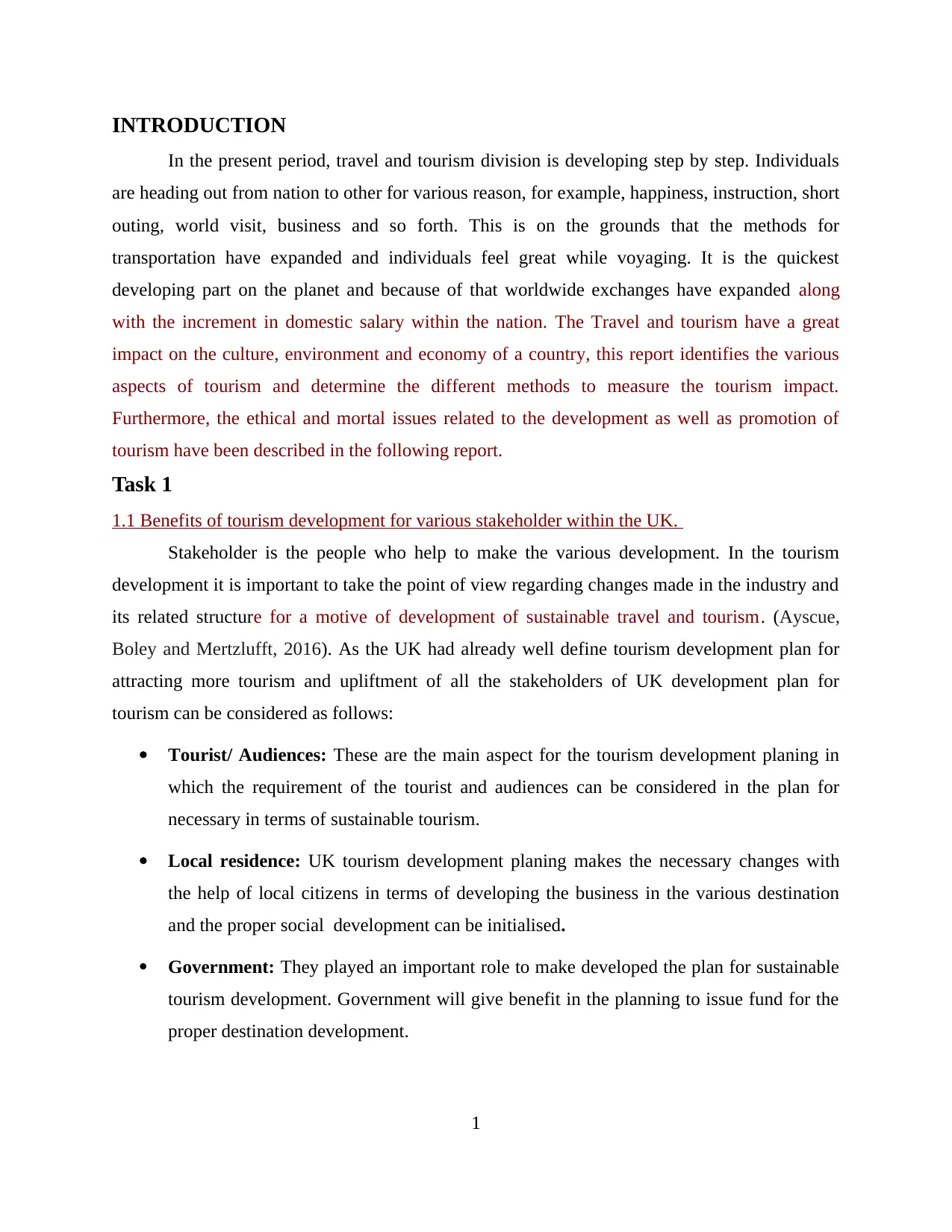
INTRODUCTION
In the present period, travel and tourism division is developing step by step. Individuals
are heading out from nation to other for various reason, for example, happiness, instruction, short
outing, world visit, business and so forth. This is on the grounds that the methods for
transportation have expanded and individuals feel great while voyaging. It is the quickest
developing part on the planet and because of that worldwide exchanges have expanded along
with the increment in domestic salary within the nation. The Travel and tourism have a great
impact on the culture, environment and economy of a country, this report identifies the various
aspects of tourism and determine the different methods to measure the tourism impact.
Furthermore, the ethical and mortal issues related to the development as well as promotion of
tourism have been described in the following report.
Task 1
1.1 Benefits of tourism development for various stakeholder within the UK.
Stakeholder is the people who help to make the various development. In the tourism
development it is important to take the point of view regarding changes made in the industry and
its related structure for a motive of development of sustainable travel and tourism. (Ayscue,
Boley and Mertzlufft, 2016). As the UK had already well define tourism development plan for
attracting more tourism and upliftment of all the stakeholders of UK development plan for
tourism can be considered as follows:
Tourist/ Audiences: These are the main aspect for the tourism development planing in
which the requirement of the tourist and audiences can be considered in the plan for
necessary in terms of sustainable tourism.
Local residence: UK tourism development planing makes the necessary changes with
the help of local citizens in terms of developing the business in the various destination
and the proper social development can be initialised.
Government: They played an important role to make developed the plan for sustainable
tourism development. Government will give benefit in the planning to issue fund for the
proper destination development.
1
In the present period, travel and tourism division is developing step by step. Individuals
are heading out from nation to other for various reason, for example, happiness, instruction, short
outing, world visit, business and so forth. This is on the grounds that the methods for
transportation have expanded and individuals feel great while voyaging. It is the quickest
developing part on the planet and because of that worldwide exchanges have expanded along
with the increment in domestic salary within the nation. The Travel and tourism have a great
impact on the culture, environment and economy of a country, this report identifies the various
aspects of tourism and determine the different methods to measure the tourism impact.
Furthermore, the ethical and mortal issues related to the development as well as promotion of
tourism have been described in the following report.
Task 1
1.1 Benefits of tourism development for various stakeholder within the UK.
Stakeholder is the people who help to make the various development. In the tourism
development it is important to take the point of view regarding changes made in the industry and
its related structure for a motive of development of sustainable travel and tourism. (Ayscue,
Boley and Mertzlufft, 2016). As the UK had already well define tourism development plan for
attracting more tourism and upliftment of all the stakeholders of UK development plan for
tourism can be considered as follows:
Tourist/ Audiences: These are the main aspect for the tourism development planing in
which the requirement of the tourist and audiences can be considered in the plan for
necessary in terms of sustainable tourism.
Local residence: UK tourism development planing makes the necessary changes with
the help of local citizens in terms of developing the business in the various destination
and the proper social development can be initialised.
Government: They played an important role to make developed the plan for sustainable
tourism development. Government will give benefit in the planning to issue fund for the
proper destination development.
1
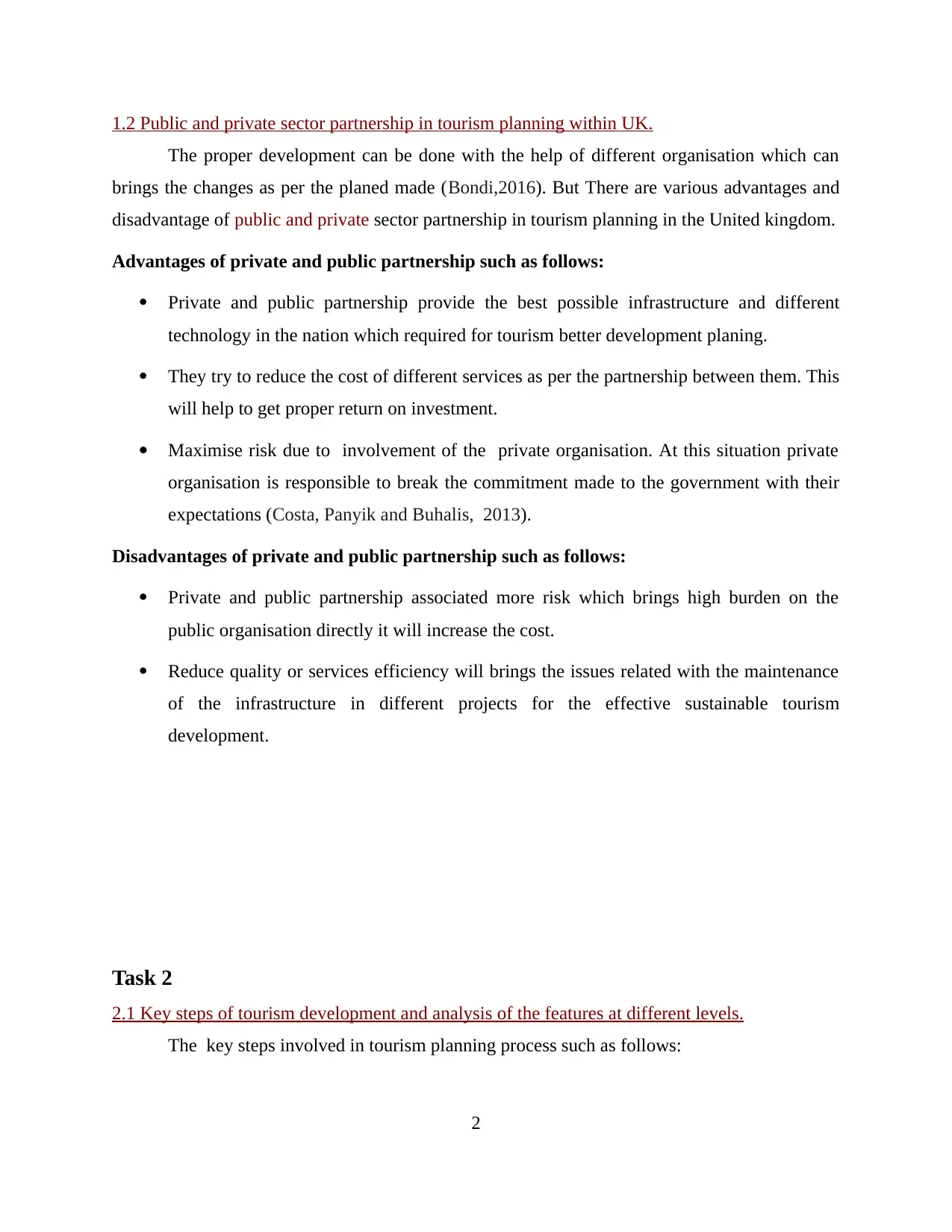
1.2 Public and private sector partnership in tourism planning within UK.
The proper development can be done with the help of different organisation which can
brings the changes as per the planed made (Bondi,2016). But There are various advantages and
disadvantage of public and private sector partnership in tourism planning in the United kingdom.
Advantages of private and public partnership such as follows:
Private and public partnership provide the best possible infrastructure and different
technology in the nation which required for tourism better development planing.
They try to reduce the cost of different services as per the partnership between them. This
will help to get proper return on investment.
Maximise risk due to involvement of the private organisation. At this situation private
organisation is responsible to break the commitment made to the government with their
expectations (Costa, Panyik and Buhalis, 2013).
Disadvantages of private and public partnership such as follows:
Private and public partnership associated more risk which brings high burden on the
public organisation directly it will increase the cost.
Reduce quality or services efficiency will brings the issues related with the maintenance
of the infrastructure in different projects for the effective sustainable tourism
development.
Task 2
2.1 Key steps of tourism development and analysis of the features at different levels.
The key steps involved in tourism planning process such as follows:
2
The proper development can be done with the help of different organisation which can
brings the changes as per the planed made (Bondi,2016). But There are various advantages and
disadvantage of public and private sector partnership in tourism planning in the United kingdom.
Advantages of private and public partnership such as follows:
Private and public partnership provide the best possible infrastructure and different
technology in the nation which required for tourism better development planing.
They try to reduce the cost of different services as per the partnership between them. This
will help to get proper return on investment.
Maximise risk due to involvement of the private organisation. At this situation private
organisation is responsible to break the commitment made to the government with their
expectations (Costa, Panyik and Buhalis, 2013).
Disadvantages of private and public partnership such as follows:
Private and public partnership associated more risk which brings high burden on the
public organisation directly it will increase the cost.
Reduce quality or services efficiency will brings the issues related with the maintenance
of the infrastructure in different projects for the effective sustainable tourism
development.
Task 2
2.1 Key steps of tourism development and analysis of the features at different levels.
The key steps involved in tourism planning process such as follows:
2
Secure Best Marks with AI Grader
Need help grading? Try our AI Grader for instant feedback on your assignments.
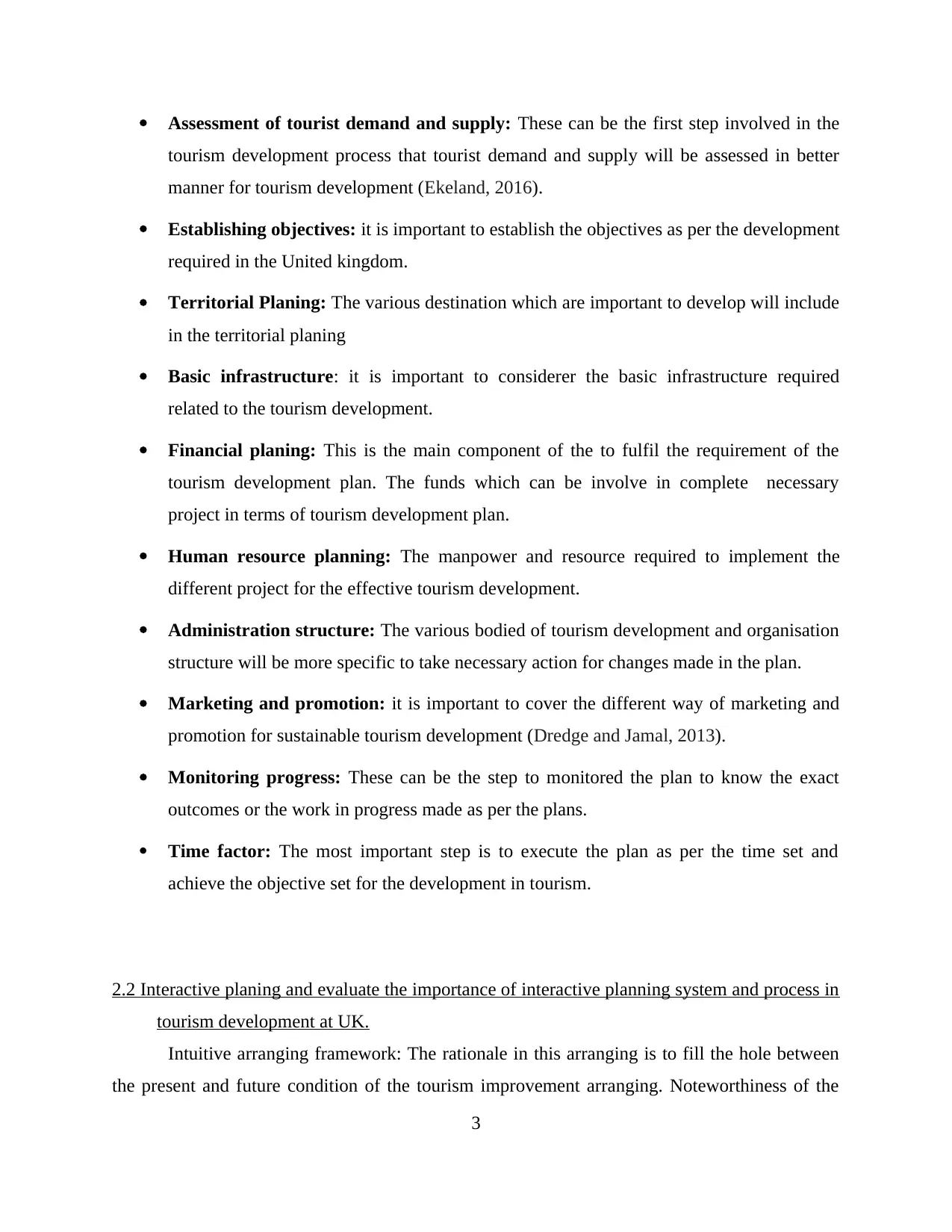
Assessment of tourist demand and supply: These can be the first step involved in the
tourism development process that tourist demand and supply will be assessed in better
manner for tourism development (Ekeland, 2016).
Establishing objectives: it is important to establish the objectives as per the development
required in the United kingdom.
Territorial Planing: The various destination which are important to develop will include
in the territorial planing
Basic infrastructure: it is important to considerer the basic infrastructure required
related to the tourism development.
Financial planing: This is the main component of the to fulfil the requirement of the
tourism development plan. The funds which can be involve in complete necessary
project in terms of tourism development plan.
Human resource planning: The manpower and resource required to implement the
different project for the effective tourism development.
Administration structure: The various bodied of tourism development and organisation
structure will be more specific to take necessary action for changes made in the plan.
Marketing and promotion: it is important to cover the different way of marketing and
promotion for sustainable tourism development (Dredge and Jamal, 2013).
Monitoring progress: These can be the step to monitored the plan to know the exact
outcomes or the work in progress made as per the plans.
Time factor: The most important step is to execute the plan as per the time set and
achieve the objective set for the development in tourism.
2.2 Interactive planing and evaluate the importance of interactive planning system and process in
tourism development at UK.
Intuitive arranging framework: The rationale in this arranging is to fill the hole between
the present and future condition of the tourism improvement arranging. Noteworthiness of the
3
tourism development process that tourist demand and supply will be assessed in better
manner for tourism development (Ekeland, 2016).
Establishing objectives: it is important to establish the objectives as per the development
required in the United kingdom.
Territorial Planing: The various destination which are important to develop will include
in the territorial planing
Basic infrastructure: it is important to considerer the basic infrastructure required
related to the tourism development.
Financial planing: This is the main component of the to fulfil the requirement of the
tourism development plan. The funds which can be involve in complete necessary
project in terms of tourism development plan.
Human resource planning: The manpower and resource required to implement the
different project for the effective tourism development.
Administration structure: The various bodied of tourism development and organisation
structure will be more specific to take necessary action for changes made in the plan.
Marketing and promotion: it is important to cover the different way of marketing and
promotion for sustainable tourism development (Dredge and Jamal, 2013).
Monitoring progress: These can be the step to monitored the plan to know the exact
outcomes or the work in progress made as per the plans.
Time factor: The most important step is to execute the plan as per the time set and
achieve the objective set for the development in tourism.
2.2 Interactive planing and evaluate the importance of interactive planning system and process in
tourism development at UK.
Intuitive arranging framework: The rationale in this arranging is to fill the hole between
the present and future condition of the tourism improvement arranging. Noteworthiness of the
3
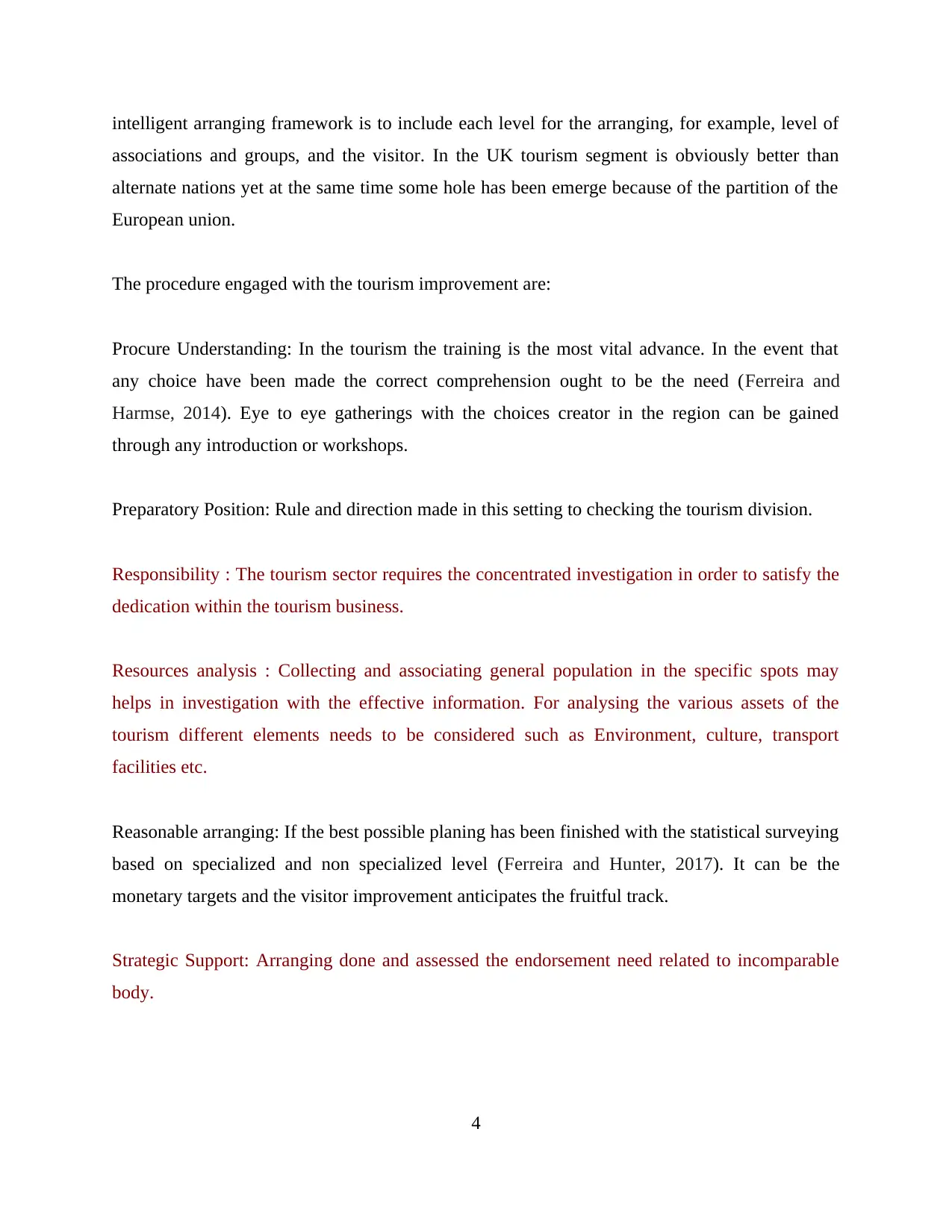
intelligent arranging framework is to include each level for the arranging, for example, level of
associations and groups, and the visitor. In the UK tourism segment is obviously better than
alternate nations yet at the same time some hole has been emerge because of the partition of the
European union.
The procedure engaged with the tourism improvement are:
Procure Understanding: In the tourism the training is the most vital advance. In the event that
any choice have been made the correct comprehension ought to be the need (Ferreira and
Harmse, 2014). Eye to eye gatherings with the choices creator in the region can be gained
through any introduction or workshops.
Preparatory Position: Rule and direction made in this setting to checking the tourism division.
Responsibility : The tourism sector requires the concentrated investigation in order to satisfy the
dedication within the tourism business.
Resources analysis : Collecting and associating general population in the specific spots may
helps in investigation with the effective information. For analysing the various assets of the
tourism different elements needs to be considered such as Environment, culture, transport
facilities etc.
Reasonable arranging: If the best possible planing has been finished with the statistical surveying
based on specialized and non specialized level (Ferreira and Hunter, 2017). It can be the
monetary targets and the visitor improvement anticipates the fruitful track.
Strategic Support: Arranging done and assessed the endorsement need related to incomparable
body.
4
associations and groups, and the visitor. In the UK tourism segment is obviously better than
alternate nations yet at the same time some hole has been emerge because of the partition of the
European union.
The procedure engaged with the tourism improvement are:
Procure Understanding: In the tourism the training is the most vital advance. In the event that
any choice have been made the correct comprehension ought to be the need (Ferreira and
Harmse, 2014). Eye to eye gatherings with the choices creator in the region can be gained
through any introduction or workshops.
Preparatory Position: Rule and direction made in this setting to checking the tourism division.
Responsibility : The tourism sector requires the concentrated investigation in order to satisfy the
dedication within the tourism business.
Resources analysis : Collecting and associating general population in the specific spots may
helps in investigation with the effective information. For analysing the various assets of the
tourism different elements needs to be considered such as Environment, culture, transport
facilities etc.
Reasonable arranging: If the best possible planing has been finished with the statistical surveying
based on specialized and non specialized level (Ferreira and Hunter, 2017). It can be the
monetary targets and the visitor improvement anticipates the fruitful track.
Strategic Support: Arranging done and assessed the endorsement need related to incomparable
body.
4
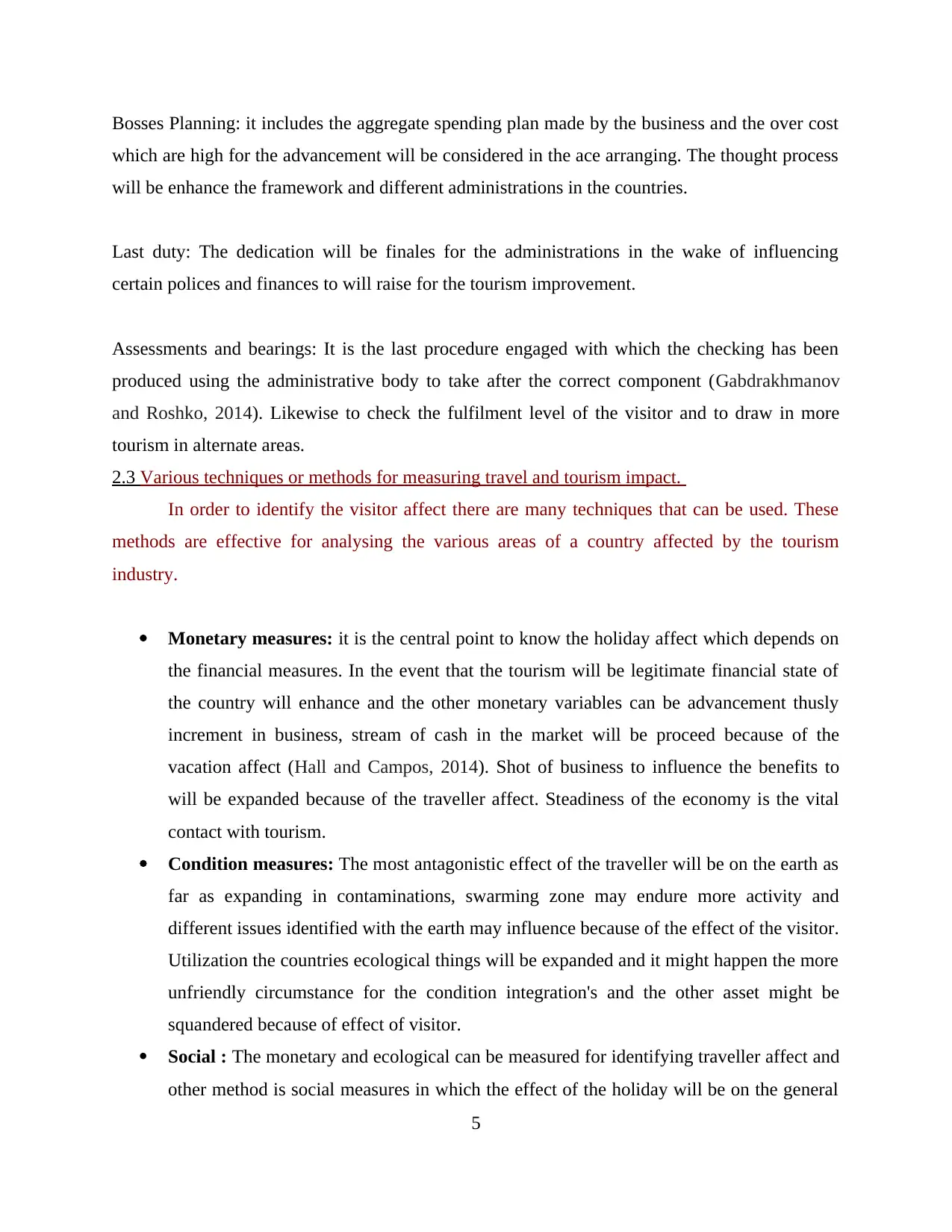
Bosses Planning: it includes the aggregate spending plan made by the business and the over cost
which are high for the advancement will be considered in the ace arranging. The thought process
will be enhance the framework and different administrations in the countries.
Last duty: The dedication will be finales for the administrations in the wake of influencing
certain polices and finances to will raise for the tourism improvement.
Assessments and bearings: It is the last procedure engaged with which the checking has been
produced using the administrative body to take after the correct component (Gabdrakhmanov
and Roshko, 2014). Likewise to check the fulfilment level of the visitor and to draw in more
tourism in alternate areas.
2.3 Various techniques or methods for measuring travel and tourism impact.
In order to identify the visitor affect there are many techniques that can be used. These
methods are effective for analysing the various areas of a country affected by the tourism
industry.
Monetary measures: it is the central point to know the holiday affect which depends on
the financial measures. In the event that the tourism will be legitimate financial state of
the country will enhance and the other monetary variables can be advancement thusly
increment in business, stream of cash in the market will be proceed because of the
vacation affect (Hall and Campos, 2014). Shot of business to influence the benefits to
will be expanded because of the traveller affect. Steadiness of the economy is the vital
contact with tourism.
Condition measures: The most antagonistic effect of the traveller will be on the earth as
far as expanding in contaminations, swarming zone may endure more activity and
different issues identified with the earth may influence because of the effect of the visitor.
Utilization the countries ecological things will be expanded and it might happen the more
unfriendly circumstance for the condition integration's and the other asset might be
squandered because of effect of visitor.
Social : The monetary and ecological can be measured for identifying traveller affect and
other method is social measures in which the effect of the holiday will be on the general
5
which are high for the advancement will be considered in the ace arranging. The thought process
will be enhance the framework and different administrations in the countries.
Last duty: The dedication will be finales for the administrations in the wake of influencing
certain polices and finances to will raise for the tourism improvement.
Assessments and bearings: It is the last procedure engaged with which the checking has been
produced using the administrative body to take after the correct component (Gabdrakhmanov
and Roshko, 2014). Likewise to check the fulfilment level of the visitor and to draw in more
tourism in alternate areas.
2.3 Various techniques or methods for measuring travel and tourism impact.
In order to identify the visitor affect there are many techniques that can be used. These
methods are effective for analysing the various areas of a country affected by the tourism
industry.
Monetary measures: it is the central point to know the holiday affect which depends on
the financial measures. In the event that the tourism will be legitimate financial state of
the country will enhance and the other monetary variables can be advancement thusly
increment in business, stream of cash in the market will be proceed because of the
vacation affect (Hall and Campos, 2014). Shot of business to influence the benefits to
will be expanded because of the traveller affect. Steadiness of the economy is the vital
contact with tourism.
Condition measures: The most antagonistic effect of the traveller will be on the earth as
far as expanding in contaminations, swarming zone may endure more activity and
different issues identified with the earth may influence because of the effect of the visitor.
Utilization the countries ecological things will be expanded and it might happen the more
unfriendly circumstance for the condition integration's and the other asset might be
squandered because of effect of visitor.
Social : The monetary and ecological can be measured for identifying traveller affect and
other method is social measures in which the effect of the holiday will be on the general
5
Paraphrase This Document
Need a fresh take? Get an instant paraphrase of this document with our AI Paraphraser
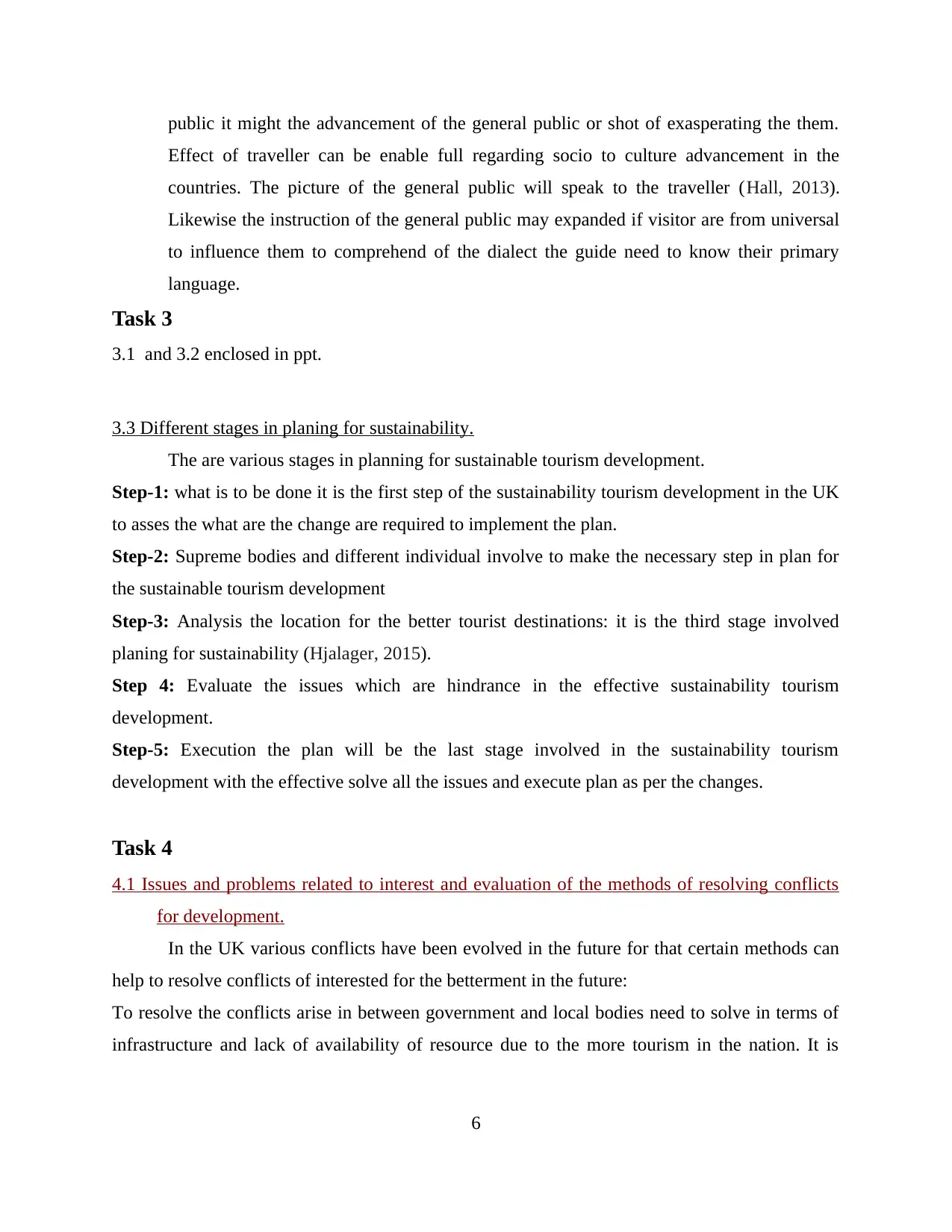
public it might the advancement of the general public or shot of exasperating the them.
Effect of traveller can be enable full regarding socio to culture advancement in the
countries. The picture of the general public will speak to the traveller (Hall, 2013).
Likewise the instruction of the general public may expanded if visitor are from universal
to influence them to comprehend of the dialect the guide need to know their primary
language.
Task 3
3.1 and 3.2 enclosed in ppt.
3.3 Different stages in planing for sustainability.
The are various stages in planning for sustainable tourism development.
Step-1: what is to be done it is the first step of the sustainability tourism development in the UK
to asses the what are the change are required to implement the plan.
Step-2: Supreme bodies and different individual involve to make the necessary step in plan for
the sustainable tourism development
Step-3: Analysis the location for the better tourist destinations: it is the third stage involved
planing for sustainability (Hjalager, 2015).
Step 4: Evaluate the issues which are hindrance in the effective sustainability tourism
development.
Step-5: Execution the plan will be the last stage involved in the sustainability tourism
development with the effective solve all the issues and execute plan as per the changes.
Task 4
4.1 Issues and problems related to interest and evaluation of the methods of resolving conflicts
for development.
In the UK various conflicts have been evolved in the future for that certain methods can
help to resolve conflicts of interested for the betterment in the future:
To resolve the conflicts arise in between government and local bodies need to solve in terms of
infrastructure and lack of availability of resource due to the more tourism in the nation. It is
6
Effect of traveller can be enable full regarding socio to culture advancement in the
countries. The picture of the general public will speak to the traveller (Hall, 2013).
Likewise the instruction of the general public may expanded if visitor are from universal
to influence them to comprehend of the dialect the guide need to know their primary
language.
Task 3
3.1 and 3.2 enclosed in ppt.
3.3 Different stages in planing for sustainability.
The are various stages in planning for sustainable tourism development.
Step-1: what is to be done it is the first step of the sustainability tourism development in the UK
to asses the what are the change are required to implement the plan.
Step-2: Supreme bodies and different individual involve to make the necessary step in plan for
the sustainable tourism development
Step-3: Analysis the location for the better tourist destinations: it is the third stage involved
planing for sustainability (Hjalager, 2015).
Step 4: Evaluate the issues which are hindrance in the effective sustainability tourism
development.
Step-5: Execution the plan will be the last stage involved in the sustainability tourism
development with the effective solve all the issues and execute plan as per the changes.
Task 4
4.1 Issues and problems related to interest and evaluation of the methods of resolving conflicts
for development.
In the UK various conflicts have been evolved in the future for that certain methods can
help to resolve conflicts of interested for the betterment in the future:
To resolve the conflicts arise in between government and local bodies need to solve in terms of
infrastructure and lack of availability of resource due to the more tourism in the nation. It is
6
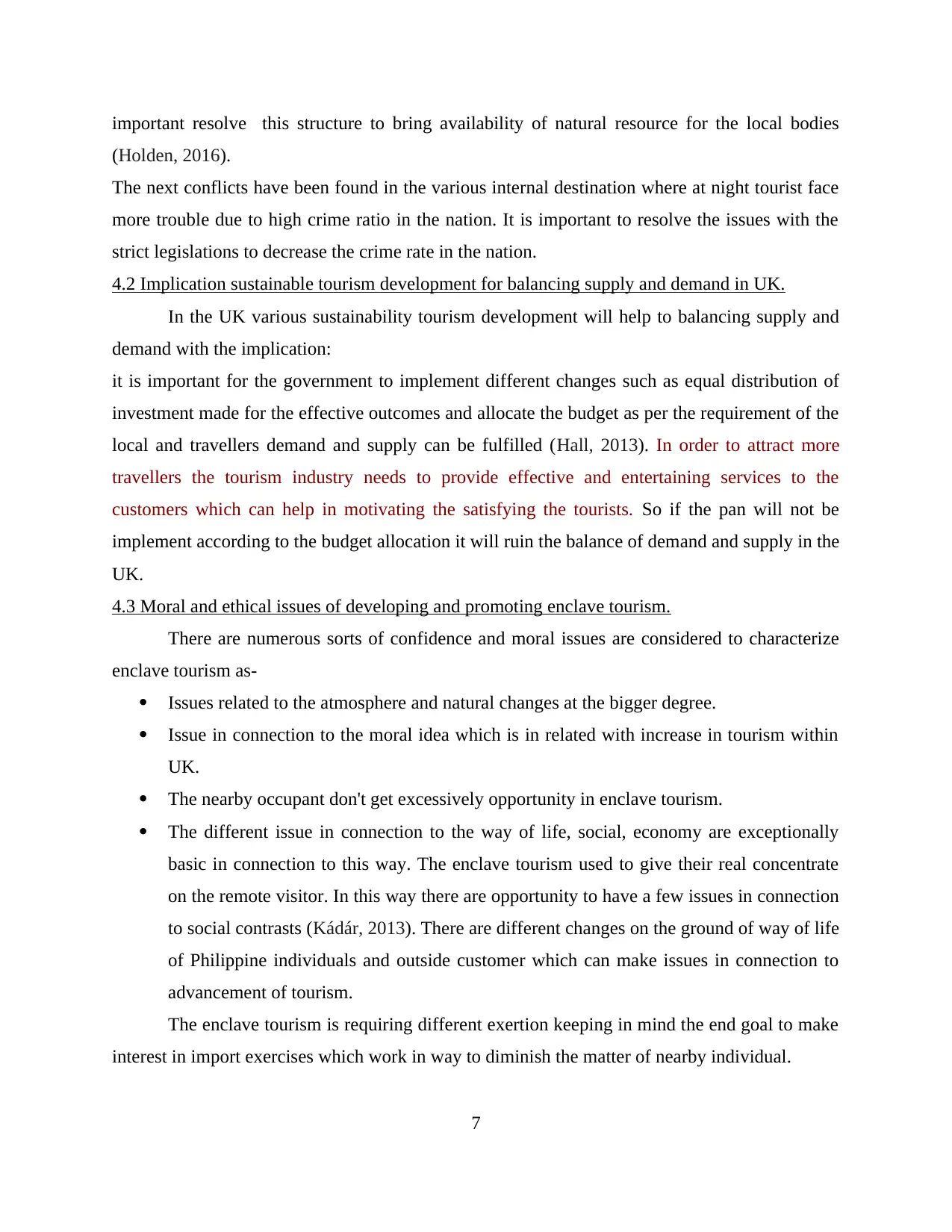
important resolve this structure to bring availability of natural resource for the local bodies
(Holden, 2016).
The next conflicts have been found in the various internal destination where at night tourist face
more trouble due to high crime ratio in the nation. It is important to resolve the issues with the
strict legislations to decrease the crime rate in the nation.
4.2 Implication sustainable tourism development for balancing supply and demand in UK.
In the UK various sustainability tourism development will help to balancing supply and
demand with the implication:
it is important for the government to implement different changes such as equal distribution of
investment made for the effective outcomes and allocate the budget as per the requirement of the
local and travellers demand and supply can be fulfilled (Hall, 2013). In order to attract more
travellers the tourism industry needs to provide effective and entertaining services to the
customers which can help in motivating the satisfying the tourists. So if the pan will not be
implement according to the budget allocation it will ruin the balance of demand and supply in the
UK.
4.3 Moral and ethical issues of developing and promoting enclave tourism.
There are numerous sorts of confidence and moral issues are considered to characterize
enclave tourism as-
Issues related to the atmosphere and natural changes at the bigger degree.
Issue in connection to the moral idea which is in related with increase in tourism within
UK.
The nearby occupant don't get excessively opportunity in enclave tourism.
The different issue in connection to the way of life, social, economy are exceptionally
basic in connection to this way. The enclave tourism used to give their real concentrate
on the remote visitor. In this way there are opportunity to have a few issues in connection
to social contrasts (Kádár, 2013). There are different changes on the ground of way of life
of Philippine individuals and outside customer which can make issues in connection to
advancement of tourism.
The enclave tourism is requiring different exertion keeping in mind the end goal to make
interest in import exercises which work in way to diminish the matter of nearby individual.
7
(Holden, 2016).
The next conflicts have been found in the various internal destination where at night tourist face
more trouble due to high crime ratio in the nation. It is important to resolve the issues with the
strict legislations to decrease the crime rate in the nation.
4.2 Implication sustainable tourism development for balancing supply and demand in UK.
In the UK various sustainability tourism development will help to balancing supply and
demand with the implication:
it is important for the government to implement different changes such as equal distribution of
investment made for the effective outcomes and allocate the budget as per the requirement of the
local and travellers demand and supply can be fulfilled (Hall, 2013). In order to attract more
travellers the tourism industry needs to provide effective and entertaining services to the
customers which can help in motivating the satisfying the tourists. So if the pan will not be
implement according to the budget allocation it will ruin the balance of demand and supply in the
UK.
4.3 Moral and ethical issues of developing and promoting enclave tourism.
There are numerous sorts of confidence and moral issues are considered to characterize
enclave tourism as-
Issues related to the atmosphere and natural changes at the bigger degree.
Issue in connection to the moral idea which is in related with increase in tourism within
UK.
The nearby occupant don't get excessively opportunity in enclave tourism.
The different issue in connection to the way of life, social, economy are exceptionally
basic in connection to this way. The enclave tourism used to give their real concentrate
on the remote visitor. In this way there are opportunity to have a few issues in connection
to social contrasts (Kádár, 2013). There are different changes on the ground of way of life
of Philippine individuals and outside customer which can make issues in connection to
advancement of tourism.
The enclave tourism is requiring different exertion keeping in mind the end goal to make
interest in import exercises which work in way to diminish the matter of nearby individual.
7
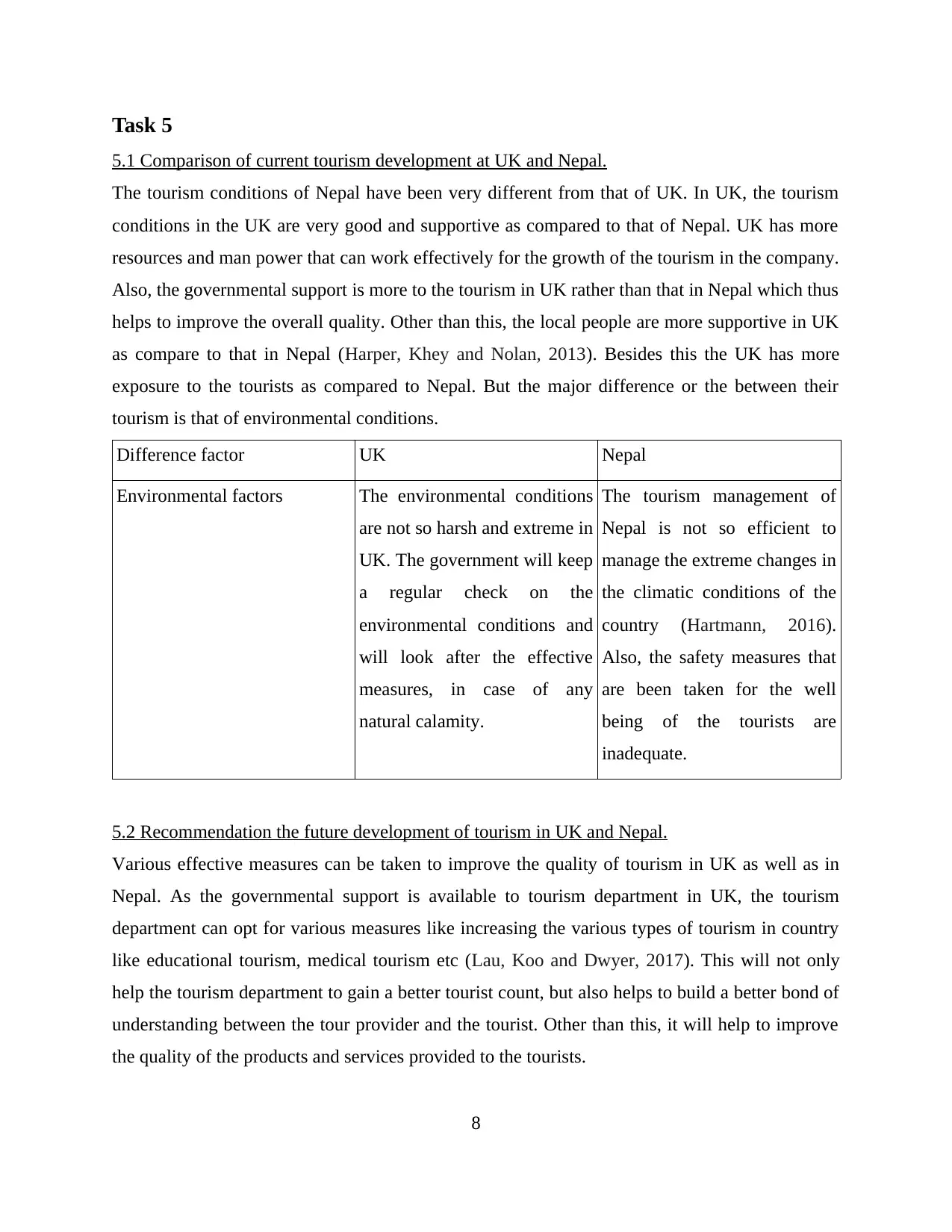
Task 5
5.1 Comparison of current tourism development at UK and Nepal.
The tourism conditions of Nepal have been very different from that of UK. In UK, the tourism
conditions in the UK are very good and supportive as compared to that of Nepal. UK has more
resources and man power that can work effectively for the growth of the tourism in the company.
Also, the governmental support is more to the tourism in UK rather than that in Nepal which thus
helps to improve the overall quality. Other than this, the local people are more supportive in UK
as compare to that in Nepal (Harper, Khey and Nolan, 2013). Besides this the UK has more
exposure to the tourists as compared to Nepal. But the major difference or the between their
tourism is that of environmental conditions.
Difference factor UK Nepal
Environmental factors The environmental conditions
are not so harsh and extreme in
UK. The government will keep
a regular check on the
environmental conditions and
will look after the effective
measures, in case of any
natural calamity.
The tourism management of
Nepal is not so efficient to
manage the extreme changes in
the climatic conditions of the
country (Hartmann, 2016).
Also, the safety measures that
are been taken for the well
being of the tourists are
inadequate.
5.2 Recommendation the future development of tourism in UK and Nepal.
Various effective measures can be taken to improve the quality of tourism in UK as well as in
Nepal. As the governmental support is available to tourism department in UK, the tourism
department can opt for various measures like increasing the various types of tourism in country
like educational tourism, medical tourism etc (Lau, Koo and Dwyer, 2017). This will not only
help the tourism department to gain a better tourist count, but also helps to build a better bond of
understanding between the tour provider and the tourist. Other than this, it will help to improve
the quality of the products and services provided to the tourists.
8
5.1 Comparison of current tourism development at UK and Nepal.
The tourism conditions of Nepal have been very different from that of UK. In UK, the tourism
conditions in the UK are very good and supportive as compared to that of Nepal. UK has more
resources and man power that can work effectively for the growth of the tourism in the company.
Also, the governmental support is more to the tourism in UK rather than that in Nepal which thus
helps to improve the overall quality. Other than this, the local people are more supportive in UK
as compare to that in Nepal (Harper, Khey and Nolan, 2013). Besides this the UK has more
exposure to the tourists as compared to Nepal. But the major difference or the between their
tourism is that of environmental conditions.
Difference factor UK Nepal
Environmental factors The environmental conditions
are not so harsh and extreme in
UK. The government will keep
a regular check on the
environmental conditions and
will look after the effective
measures, in case of any
natural calamity.
The tourism management of
Nepal is not so efficient to
manage the extreme changes in
the climatic conditions of the
country (Hartmann, 2016).
Also, the safety measures that
are been taken for the well
being of the tourists are
inadequate.
5.2 Recommendation the future development of tourism in UK and Nepal.
Various effective measures can be taken to improve the quality of tourism in UK as well as in
Nepal. As the governmental support is available to tourism department in UK, the tourism
department can opt for various measures like increasing the various types of tourism in country
like educational tourism, medical tourism etc (Lau, Koo and Dwyer, 2017). This will not only
help the tourism department to gain a better tourist count, but also helps to build a better bond of
understanding between the tour provider and the tourist. Other than this, it will help to improve
the quality of the products and services provided to the tourists.
8
Secure Best Marks with AI Grader
Need help grading? Try our AI Grader for instant feedback on your assignments.
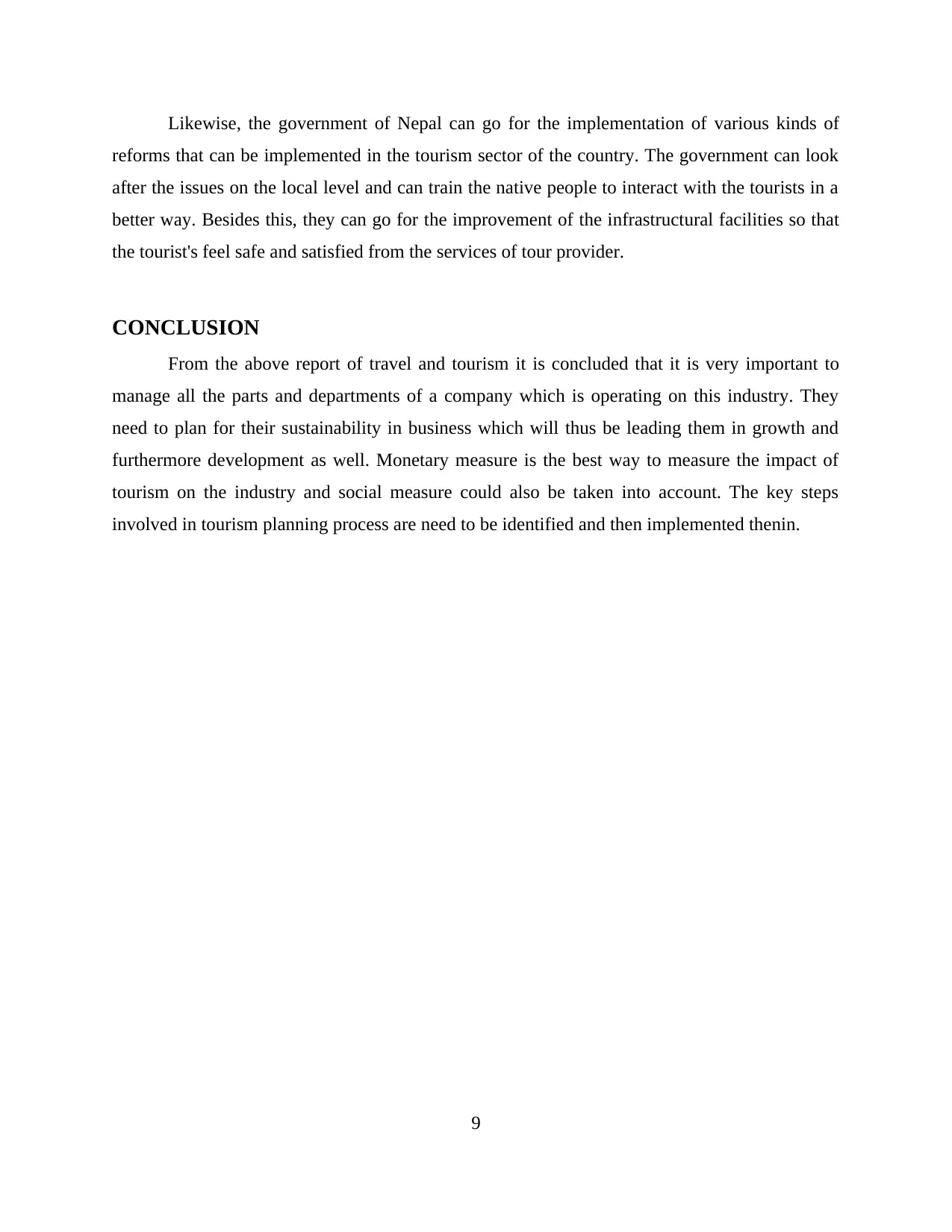
Likewise, the government of Nepal can go for the implementation of various kinds of
reforms that can be implemented in the tourism sector of the country. The government can look
after the issues on the local level and can train the native people to interact with the tourists in a
better way. Besides this, they can go for the improvement of the infrastructural facilities so that
the tourist's feel safe and satisfied from the services of tour provider.
CONCLUSION
From the above report of travel and tourism it is concluded that it is very important to
manage all the parts and departments of a company which is operating on this industry. They
need to plan for their sustainability in business which will thus be leading them in growth and
furthermore development as well. Monetary measure is the best way to measure the impact of
tourism on the industry and social measure could also be taken into account. The key steps
involved in tourism planning process are need to be identified and then implemented thenin.
9
reforms that can be implemented in the tourism sector of the country. The government can look
after the issues on the local level and can train the native people to interact with the tourists in a
better way. Besides this, they can go for the improvement of the infrastructural facilities so that
the tourist's feel safe and satisfied from the services of tour provider.
CONCLUSION
From the above report of travel and tourism it is concluded that it is very important to
manage all the parts and departments of a company which is operating on this industry. They
need to plan for their sustainability in business which will thus be leading them in growth and
furthermore development as well. Monetary measure is the best way to measure the impact of
tourism on the industry and social measure could also be taken into account. The key steps
involved in tourism planning process are need to be identified and then implemented thenin.
9
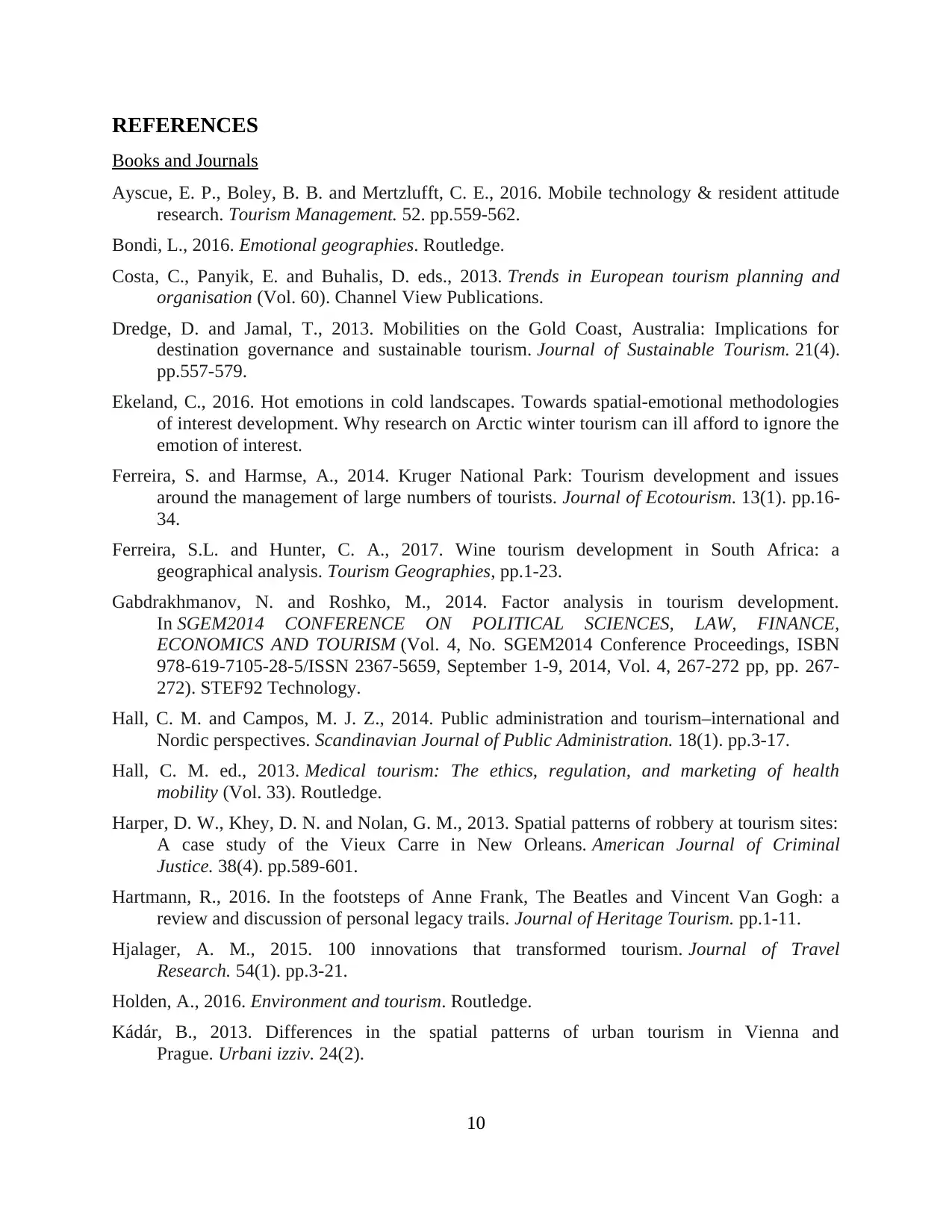
REFERENCES
Books and Journals
Ayscue, E. P., Boley, B. B. and Mertzlufft, C. E., 2016. Mobile technology & resident attitude
research. Tourism Management. 52. pp.559-562.
Bondi, L., 2016. Emotional geographies. Routledge.
Costa, C., Panyik, E. and Buhalis, D. eds., 2013. Trends in European tourism planning and
organisation (Vol. 60). Channel View Publications.
Dredge, D. and Jamal, T., 2013. Mobilities on the Gold Coast, Australia: Implications for
destination governance and sustainable tourism. Journal of Sustainable Tourism. 21(4).
pp.557-579.
Ekeland, C., 2016. Hot emotions in cold landscapes. Towards spatial-emotional methodologies
of interest development. Why research on Arctic winter tourism can ill afford to ignore the
emotion of interest.
Ferreira, S. and Harmse, A., 2014. Kruger National Park: Tourism development and issues
around the management of large numbers of tourists. Journal of Ecotourism. 13(1). pp.16-
34.
Ferreira, S.L. and Hunter, C. A., 2017. Wine tourism development in South Africa: a
geographical analysis. Tourism Geographies, pp.1-23.
Gabdrakhmanov, N. and Roshko, M., 2014. Factor analysis in tourism development.
In SGEM2014 CONFERENCE ON POLITICAL SCIENCES, LAW, FINANCE,
ECONOMICS AND TOURISM (Vol. 4, No. SGEM2014 Conference Proceedings, ISBN
978-619-7105-28-5/ISSN 2367-5659, September 1-9, 2014, Vol. 4, 267-272 pp, pp. 267-
272). STEF92 Technology.
Hall, C. M. and Campos, M. J. Z., 2014. Public administration and tourism–international and
Nordic perspectives. Scandinavian Journal of Public Administration. 18(1). pp.3-17.
Hall, C. M. ed., 2013. Medical tourism: The ethics, regulation, and marketing of health
mobility (Vol. 33). Routledge.
Harper, D. W., Khey, D. N. and Nolan, G. M., 2013. Spatial patterns of robbery at tourism sites:
A case study of the Vieux Carre in New Orleans. American Journal of Criminal
Justice. 38(4). pp.589-601.
Hartmann, R., 2016. In the footsteps of Anne Frank, The Beatles and Vincent Van Gogh: a
review and discussion of personal legacy trails. Journal of Heritage Tourism. pp.1-11.
Hjalager, A. M., 2015. 100 innovations that transformed tourism. Journal of Travel
Research. 54(1). pp.3-21.
Holden, A., 2016. Environment and tourism. Routledge.
Kádár, B., 2013. Differences in the spatial patterns of urban tourism in Vienna and
Prague. Urbani izziv. 24(2).
10
Books and Journals
Ayscue, E. P., Boley, B. B. and Mertzlufft, C. E., 2016. Mobile technology & resident attitude
research. Tourism Management. 52. pp.559-562.
Bondi, L., 2016. Emotional geographies. Routledge.
Costa, C., Panyik, E. and Buhalis, D. eds., 2013. Trends in European tourism planning and
organisation (Vol. 60). Channel View Publications.
Dredge, D. and Jamal, T., 2013. Mobilities on the Gold Coast, Australia: Implications for
destination governance and sustainable tourism. Journal of Sustainable Tourism. 21(4).
pp.557-579.
Ekeland, C., 2016. Hot emotions in cold landscapes. Towards spatial-emotional methodologies
of interest development. Why research on Arctic winter tourism can ill afford to ignore the
emotion of interest.
Ferreira, S. and Harmse, A., 2014. Kruger National Park: Tourism development and issues
around the management of large numbers of tourists. Journal of Ecotourism. 13(1). pp.16-
34.
Ferreira, S.L. and Hunter, C. A., 2017. Wine tourism development in South Africa: a
geographical analysis. Tourism Geographies, pp.1-23.
Gabdrakhmanov, N. and Roshko, M., 2014. Factor analysis in tourism development.
In SGEM2014 CONFERENCE ON POLITICAL SCIENCES, LAW, FINANCE,
ECONOMICS AND TOURISM (Vol. 4, No. SGEM2014 Conference Proceedings, ISBN
978-619-7105-28-5/ISSN 2367-5659, September 1-9, 2014, Vol. 4, 267-272 pp, pp. 267-
272). STEF92 Technology.
Hall, C. M. and Campos, M. J. Z., 2014. Public administration and tourism–international and
Nordic perspectives. Scandinavian Journal of Public Administration. 18(1). pp.3-17.
Hall, C. M. ed., 2013. Medical tourism: The ethics, regulation, and marketing of health
mobility (Vol. 33). Routledge.
Harper, D. W., Khey, D. N. and Nolan, G. M., 2013. Spatial patterns of robbery at tourism sites:
A case study of the Vieux Carre in New Orleans. American Journal of Criminal
Justice. 38(4). pp.589-601.
Hartmann, R., 2016. In the footsteps of Anne Frank, The Beatles and Vincent Van Gogh: a
review and discussion of personal legacy trails. Journal of Heritage Tourism. pp.1-11.
Hjalager, A. M., 2015. 100 innovations that transformed tourism. Journal of Travel
Research. 54(1). pp.3-21.
Holden, A., 2016. Environment and tourism. Routledge.
Kádár, B., 2013. Differences in the spatial patterns of urban tourism in Vienna and
Prague. Urbani izziv. 24(2).
10
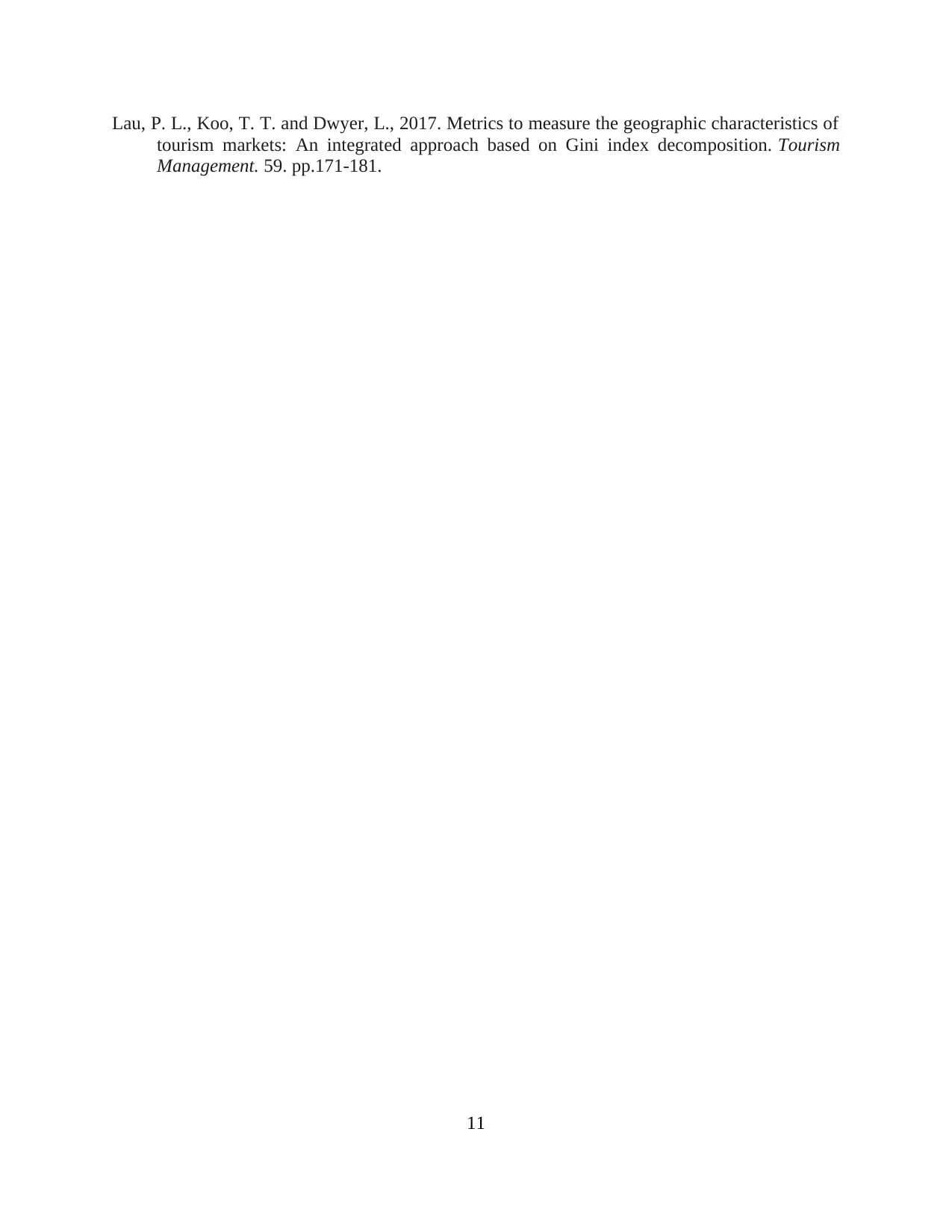
Lau, P. L., Koo, T. T. and Dwyer, L., 2017. Metrics to measure the geographic characteristics of
tourism markets: An integrated approach based on Gini index decomposition. Tourism
Management. 59. pp.171-181.
11
tourism markets: An integrated approach based on Gini index decomposition. Tourism
Management. 59. pp.171-181.
11
1 out of 13
Related Documents
Your All-in-One AI-Powered Toolkit for Academic Success.
+13062052269
info@desklib.com
Available 24*7 on WhatsApp / Email
![[object Object]](/_next/static/media/star-bottom.7253800d.svg)
Unlock your academic potential
© 2024 | Zucol Services PVT LTD | All rights reserved.





